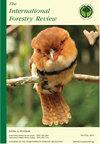森林经营单位能否促进印尼适应性共管改革?
IF 0.9
4区 农林科学
Q2 FORESTRY
引用次数: 0
摘要
本文考察了森林管理单位(FMUs)利用问题驱动迭代适应(PDIA)框架为自适应协同管理创造空间的能力。分析表明,印度尼西亚的fmu缺乏权威、能力和接受度,无法促进在场地管理层面进行适应性共同管理的改革空间。fmu需要在场址管理一级作出独立决策的权力,以便在改革进程中照顾基于地点的行动者的利益。如果没有当地参与者的信任(接受),fmu就无法维持和发展伙伴关系协议。森林管理部门需要有能力和权威赢得基于地方的行动者的信任,让他们参与讨论协作森林管理、保护和利用的未来方向。多管辖区治理体系、多中心权力体制和重叠权利使印尼解决森林治理问题的政策反应复杂化。面对作为印度尼西亚社会文化和政治现实的一部分已经存在了几个世纪的问题,在宏观上不容易得到解决。然而,我们认为这些问题可以在微观尺度上解决。适应性共同管理可以提供一种寻找这些问题的协作解决方案的方法,我们相信,当问题在一个特定区域由有限数量的利益相关者局部定义时,这种方法将是有效的。本文考察了森林管理单位(fmu)作为印度尼西亚森林管理的最低一级业务结构,促进适应性共同管理办法改革的能力。我们通过一个源自问题驱动迭代适应方法的分析框架来检验这一点。本文明确了利益相关者的接受对于fmu协调适应性共同管理的重要性。本文章由计算机程序翻译,如有差异,请以英文原文为准。
Can Forest Management Units Facilitate Adaptive Co-Management Reform in Indonesia?
HIGHLIGHTS This paper examined the capacity of Forest Management Units (FMUs) to create the space for adaptive co-management using the Problem-Driven Iterative Adaptation (PDIA) framework. The analyses show that FMUs in Indonesia lack authority and the ability and acceptance to facilitate a reform space for adaptive co-management at the site-management level. FMUs need the authority to make independent decisions at the site-management level to accommodate the interests of place-based actors in the reform process. FMUs are not able to sustain and evolve partnership agreements without trust (acceptance) from placed-based actors. FMUs need the ability and authority to win place-based actors' trust to engage them in discourse on the future direction of collaborative forest management, protection, and use. SUMMARY A multi-jurisdictional governance system, polycentric power regimes, and overlapping rights complicate policy responses for addressing forest governance problems in Indonesia. Confronting issues that have existed for centuries as part of Indonesia's socio-cultural and political reality cannot easily be solved at the macro-scale. However, we argue that they can be tackled at the micro-scale. Adaptive co-management could offer a means of finding collaborative solutions to these problems, and we believe this approach will be effective when the problems are defined locally in a specific area with a limited number of stakeholders. This paper examines the capacity of Forest Management Units (FMUs), as the lowest level operational structure of forest management in Indonesia, to facilitate reform for adaptive co-management approaches. We examined this through an analytical framework derived from the Problem-Driven Iterative Adaptation approach. This paper identifies the importance of stakeholders' acceptance to enable FMUs to coordinate adaptive co-management.
求助全文
通过发布文献求助,成功后即可免费获取论文全文。
去求助
来源期刊

International Forestry Review
农林科学-林学
CiteScore
2.50
自引率
6.20%
发文量
29
审稿时长
>36 weeks
期刊介绍:
The International Forestry Review is a peer-reviewed scholarly journal that publishes original research and review papers on forest policy and science, with an emphasis on issues of transnational significance. It is published four times per year, in March, June, September and December. Special Issues are a regular feature and attract a wide audience. Click here for subscription details.
 求助内容:
求助内容: 应助结果提醒方式:
应助结果提醒方式:


